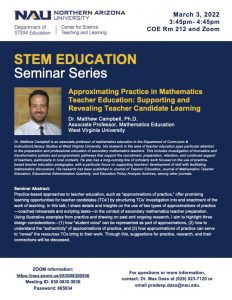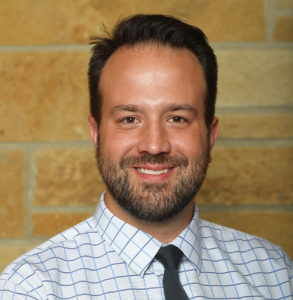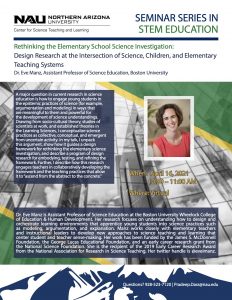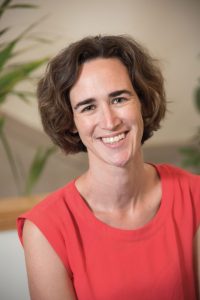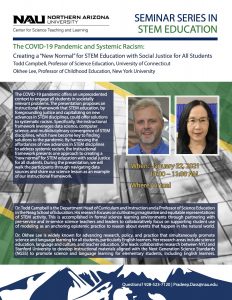Contact Center for Science Teaching and Learning
If you have questions or would like to support our efforts please contact us.
STEM Education Seminars
NAU’s Department of STEM Education and Center for Science Teaching & Learning invite you to join us
DSE and CSTL hosts experts from across the country to give seminars each semester on STEM education.
Spring 2022 lecture
March 3, 2022 | 3:45 – 4:45 pm
The recorded lecture and presentation (slides 80mb w/ video or pdf) are available.
Approximating Practice in Mathematics Teacher Education: Supporting and Revealing Teacher Candidate Learning
Practice-based approaches to teacher education, such as “approximations of practice,” offer promising learning opportunities for teacher candidates (TCs’) by structuring TCs’ investigation into and enactment of the work of teaching. In this talk, I share details and insights on the use of two types of approximations of practice —coached rehearsals and scripting tasks—in the context of secondary mathematics teacher preparation. Using illustrative examples from practice and drawing on past and ongoing research, I aim to highlight three design considerations—(1) how “student voice” can be represented as part of approximations, (2) how to understand the “authenticity” of approximations of practice, and (3) how approximations of practice can serve to “reveal” the resources TCs bring to their work. Through this, suggestions for practice, research, and their connections will be discussed.
Dr. Matthew Campbell is an associate professor of mathematics education in the Department of Curriculum & Instruction/Literacy Studies at West Virginia University. His research in the area of teacher education pays particular attention to the preparation and professional education of secondary mathematics teachers. This includes investigation of innovative and transformative policies and programmatic pathways that support the recruitment, preparation, retention, and continued support of teachers, particularly in rural contexts. He also has a long-running line of scholarly work focused on the use of practice- based teacher education pedagogies, with a particular focus on supporting teachers’ development of skill with facilitating mathematics discussions. His research has been published in Journal of Teacher Education, Journal of Mathematics Teacher Education, Educational Administration Quarterly, and Education Policy Analysis Archives, among other journals.
Spring 2021 lecture
April 16, 2021 | 10:00 – 11:00 am (Virtual)
The recorded lecture is available.
Rethinking the Elementary School Science Investigation: Design Research at the Intersection of Science, Children, and Elementary Teaching Systems
A major question in current research in science education is how to engage young students in the epistemic practices of science (for example, argumentation and modeling) in ways that are meaningful to them and powerful for the development of science understandings. Drawing from socio-cultural theory, studies of scientists at work, and established theories in the Learning Sciences, I conceptualize science practices as collective, conceptual, and emergent from uncertain activity. In my talk, I unpack this argument, show how it guides a design framework for rethinking the elementary science investigation, and describe a program of design research for embodying, testing, and refining the framework. Further, I describe how this research engages teachers in collaboratively developing the framework and the teaching practices that allow it to “ascend from the abstract to the concrete.”
Dr. Eve Manz is Assistant Professor of Science Education at the Boston University Wheelock College of Education & Human Development. Her research focuses on understanding how to design and orchestrate learning environments that apprentice young students into science practices such as modeling, argumentation, and explanation. Manz works closely with elementary teachers and instructional leaders to develop new approaches to science teaching and learning that center student and teacher sense-making. Her work has been funded by the James S. McDonnell Foundation, the George Lucas Educational Foundation, and an early career research grant from the National Science Foundation. She is the recipient of the 2019 Early Career Research Award from the National Association for Research in Science Teaching. Her twitter handle is @eveimanz.
Spring 2021 lecture
January 22, 2021 | 10:00 – 11:00 am (Virtual)
The recorded lecture and presentation slides are available.
The COVID-19 Pandemic and Systemic Racism: Creating a “New Normal” for STEM Education with Social Justice for All Students
The COVID-19 pandemic offers an unprecedented context to engage all students in societally
relevant problems. The presentation proposes an instructional framework that STEM education, by foregrounding justice and capitalizing on new advances in STEM disciplines, could offer solutions to systematic racism. Specifically, the instructional framework leverages data science, computer science, and multidisciplinary convergence of STEM disciplines, which have become key to finding solutions to the pandemic. By harnessing the affordances of new advances in STEM disciplines to address systemic racism, the instructional framework presents one approach to creating a “new normal” for STEM education with social justice for all students. During the presentation, we will walk the participants through navigating data sources and share our science lesson as an example of our instructional framework.
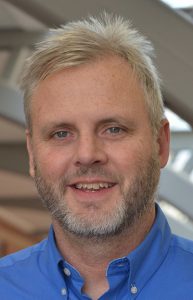 Dr. Todd Campbell is the Department Head of Curriculum and Instruction and a Professor of Science Education in the Neag School of Education. His research focuses on cultivating imaginative and equitable representations of STEM activity. This is accomplished in formal science learning environments through partnering with pre-service and in-service science teachers and leaders to collaboratively focus on supporting student use of modeling as an anchoring epistemic practice to reason about events that happen in the natural world.
Dr. Todd Campbell is the Department Head of Curriculum and Instruction and a Professor of Science Education in the Neag School of Education. His research focuses on cultivating imaginative and equitable representations of STEM activity. This is accomplished in formal science learning environments through partnering with pre-service and in-service science teachers and leaders to collaboratively focus on supporting student use of modeling as an anchoring epistemic practice to reason about events that happen in the natural world.
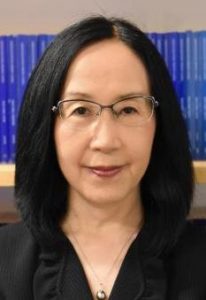 Dr. Okhee Lee is widely known for advancing research, policy, and practice that simultaneously promote science and language learning for all students, particularly English learners. Her research areas include science education, language and culture, and teacher education. She leads collaborative research between NYU and Stanford University to develop instructional materials aligned with the Next Generation Science Standards (NGSS) to promote science and language learning for elementary students, including English learners.
Dr. Okhee Lee is widely known for advancing research, policy, and practice that simultaneously promote science and language learning for all students, particularly English learners. Her research areas include science education, language and culture, and teacher education. She leads collaborative research between NYU and Stanford University to develop instructional materials aligned with the Next Generation Science Standards (NGSS) to promote science and language learning for elementary students, including English learners.
Spring 2019 lecture
April 26, 2019 | 10:30 – 11:30 am
Science & Health Building, Room 512
Northern Arizona University
Presentation slides and video available.

IDENTITY as Analytic Lens for Science Education: Critical Retrospective & Peek at the Next Horizon
Identity as an analytic lens challenges and excites science education researchers. The challenge lies in the difficulty of theorizing it in empirically accessible and conceptually rigorous ways. The excitement lies in its explanatory potential for equity in science education.
Dr. Carlone will critically examine the following three methodological approaches she has used to study Identity in science education:
- Competence, performance, and recognition as identity dimensions
- Identities-in-practice approach
- A revised Science Identity Model
She will conclude with the following persistent tensions for future identity research and present tools to think through these tensions:
- The “structure/agency” problem
- The “study-it-without-reifying-it” problem – The “identity as snapshot” problem

Dr. Heidi Carlone is the Hooks Distinguished Professor of STEM Education at The University of North Carolina at Greensboro. She is a teacher educator and educational researcher who works to make science and engineering pathways more accessible and equitable for historically underserved and underrepresented populations. Her current work focuses on three primary questions: (1) How can innovative K-12 in-school and out-of-school instruction cultivate more meaningful and expansive learning outcomes (e.g., STEM identities) for diverse youth? (2) How can K-12 diverse youths’ STEM learning ecologies be enriched in sustainable ways? (3) How can professional learning networks be designed to support, nurture, and celebrate rigorous and equitable STEM teaching and retain excellent teachers? Her studies of equity, identity, and culture in science education have earned her over $5 million dollars in external funding and a variety of teaching and research awards.
Fall 2018 lecture
September 28, 2018 | 10:30 – 11:30 am
Science & Health Building, Room 512
Northern Arizona University

Maker Chemistry: Using Makerspaces for Science Teaching
What is Maker Chemistry? Who are these “makers” and why do they need to know Chemistry? What does it all have to do with science teaching and learning?

Since 1998, Dr. Alfredo Mateus has been teaching Chemistry at COLTEC, a secondary level technical school that is part of the Universidade Federal de Minas Gerais (UFMG) in Brazil. Before that, Dr. Mateus received his Ph. D. in Chemistry from the University of Florida. Dr. Mateus is the author and co- author of several books published in Brazil on science experiments using low-cost materials. He has recently joined the professional master in education program for in-service science teachers at UFMG. He is spending the Fall 2018 semester at the CSTL as a visiting teacher scholar and researcher.
Spring 2018 lecture
February 6, 2018 | 10:30 – 11:30 am
Science & Health Building, Room 512
Northern Arizona University
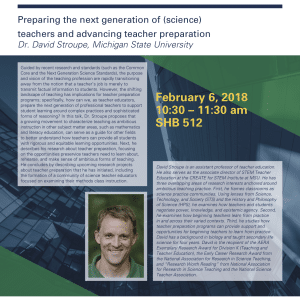
Preparing the Next Generation of (Science) Teachers and Advancing Teacher Preparation
In this talk, Dr. Stroupe proposes that a growing movement to characterize teaching as ambitious instruction in other subject matter areas, such as mathematics and literacy education, can serve as a guide for other fields to better understand how teachers can provide all students with rigorous and equitable learning opportunities. The recorded lecture is available on Youtube and the accompanying slides.
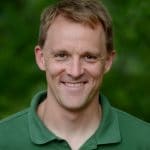
Dr. David Stroupe is an assistant professor of teacher education. He also serves as the associate director of STEM Teacher Education at the CREATE for STEM Institute at MSU.
Fall 2017 lecture
November 3, 2017 | 10:30 – 11:30 am
Science & Health Building, Room 514
Northern Arizona University
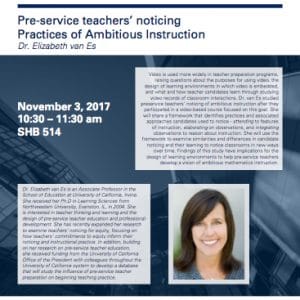
Pre-service Teachers’ Noticing Practices of Ambitious Instruction
Findings of this study have implications for the design of learning environments to help pre-service teachers develop a vision of ambitious mathematics instruction. The record lecture is available on Youtube and the accompanying slides.
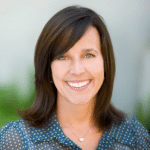
Dr. Elizabeth van Es is an Associate Professor in the School of Education at University of California, Irvine. She received her Ph.D in Learning Sciences from Northwestern University, Evanston, IL, in 2004.
Spring 2017 lecture
April 14, 2017 | 10:30 – 11:30 am
Science & Health Building, Room 512
Northern Arizona University
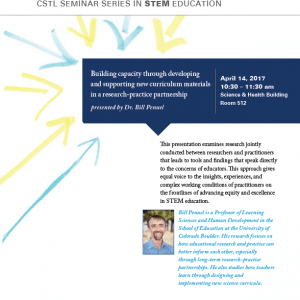
Building Capacity Through Developing and Supporting New Curriculum Materials in a Research-Practice Partnership
This presentation examines research jointly conducted between researchers and practitioners that leads to tools and findings that speak directly to the concerns of educators. This approach gives equal voice to the insights, experiences, and complex working conditions of practitioners on the frontlines of advancing equity and excellence in STEM education. The recorded lecture is available on YouTube.
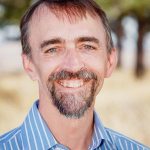
Dr. Bill Penuel is a Professor of Learning Sciences and Human Development in the School of Education at the University of Colorado Boulder. His research focuses on how educational research and practice can better inform each other, especially through long-term research-practice partnerships. He also studies how teachers learn through designing and implementing new science curricula.
Spring 2016 lecture
May 6, 2016 | 10:15 – 11:15 am
Science & Health Building, Room 512
Northern Arizona University
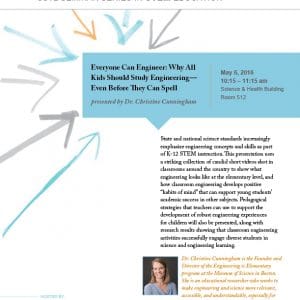
Everyone Can Engineer: Why All Kids Should Study Engineering—Even Before They Can Spell
This presentation by Dr. Christine Cunningham on May 13, 2016, used a striking collection of candid short videos shot in classrooms around the country to show what engineering looks like at the elementary level, and how classroom engineering develops positive “habits of mind” that can support young students’ academic success in other subjects. The recorded lecture is available on YouTube.
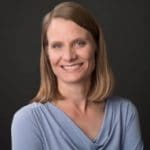
Dr. Christine Cunningham is an educational researcher who works to make engineering and science more relevant, accessible, and understandable, especially for underserved and underrepresented populations. A vice president at the Museum of Science, Boston since 2003, she founded and directs Engineering is Elementary™, a groundbreaking project that integrates engineering concepts into elementary curriculum and teacher professional development.
Inaugural lecture
October 16, 2015 | 11:30 am – 12:30 pm
Cline Library, Room 249
Northern Arizona University
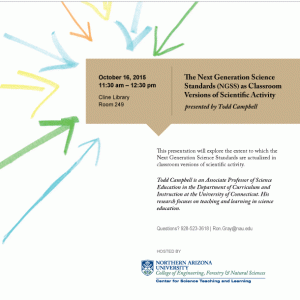
The Next Generation Science Standards (NGSS) as Classroom Versions of Scientific Activity
Thank you to everyone who was able to attend our inaugural seminar on Friday, October 16, 2015, with Dr. Todd Campbell. This presentation explored the extent to which the Next Generation Science Standards are actualized in classroom versions of scientific activity. For those who were not able to attend, he sent along his PowerPoint slides. The recorded lecture is also available on YouTube.
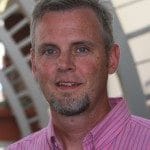 Todd Campbell is an Associate Professor of Science Education in the Department of Curriculum and Instruction at the University of Connecticut. His research focuses on teaching and learning in science education.
Todd Campbell is an Associate Professor of Science Education in the Department of Curriculum and Instruction at the University of Connecticut. His research focuses on teaching and learning in science education.
